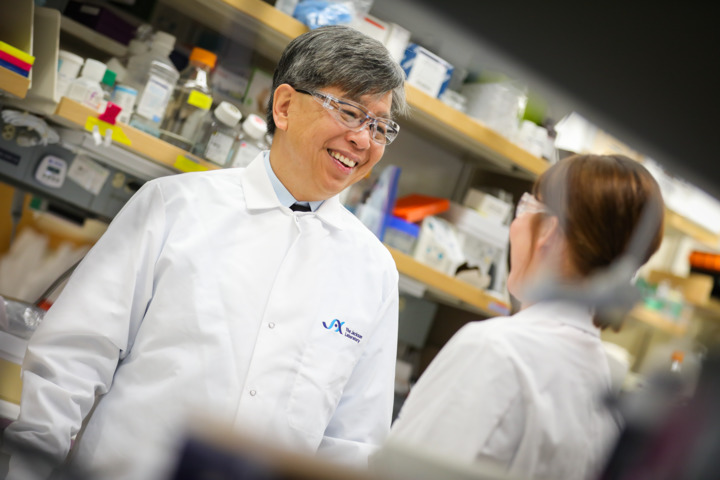 The sequencing of the first human genome in 2003 was an astonishing achievement. Having the human blueprint in hand, scientists broadcasted the promise of predictive medicine: they would be able to decipher genetic maps, predict disease risks and identify therapeutic targets. By now, scientists have cataloged more than 250,000 unique associations linking common DNA sequence variants to diseases. While this trajectory has generated rich datasets and new innovations, it has not resulted in the cures for common diseases like cancer, Alzheimer’s or diabetes.
The sequencing of the first human genome in 2003 was an astonishing achievement. Having the human blueprint in hand, scientists broadcasted the promise of predictive medicine: they would be able to decipher genetic maps, predict disease risks and identify therapeutic targets. By now, scientists have cataloged more than 250,000 unique associations linking common DNA sequence variants to diseases. While this trajectory has generated rich datasets and new innovations, it has not resulted in the cures for common diseases like cancer, Alzheimer’s or diabetes.
Why? Because there is incredible genetic complexity underlying all human disease. Cancer, for example, is comprised of thousands of cancer subtypes, and every cancer is determined by thousands of mutations with no two tumors being genetically the same. Adding to this complexity is the overlay of intricate mechanisms controlling gene activity, happening at any given point in time, within the three-dimensional space of the cells in a tumor.
“This is the challenge we have chosen to take on at The Jackson Laboratory (JAX): We seek to capture and understand the genetic complexity of any disease in order to predict its outcomes, and in the process, to identify unique vulnerabilities with which we can craft new cures,” said JAX CEO and President Edison T. Liu, M.D.
In an effort to help address this challenge, specifically as it relates to cancer, an anonymous supporter has donated $625,000 to fund cancer research initiatives at the Laboratory, wholly aimed at translating scientists’ basic understanding of genetic complexity in cancer into innovative therapeutics.
Attacking cancer
At JAX, cancer research efforts are diverse and powerful. The Laboratory’s National Cancer Institute-designated cancer center comprises approximately 50 members across two campuses with multidisciplinary expertise who are united in research aimed at understanding and targeting the genomic complexity of cancer. The Jackson Laboratory Cancer Center (JAXCC) has scientific strengths in cancer genomics, genetics, cell biology, and advanced animal and computational models of human cancer, all of which are centered on developing approaches to precision medicine. Its focus on complex genetics and functional genomics, the scale of model creation and experimentation, and the integration of diverse talents make the JAXCC a unique enterprise.
“This gift helps with our goal of not only directly attacking the cancer, but also reducing the toxicity of these treatments; to not only address the complex genomics of the cancer, but to exploit genetic diversity of human populations in order to refine therapeutic approaches,” said Liu, who also serves as director of the JAXCC.
JAX cancer researchers will use the funds to create a data ecosystem to drive predictive biology, in which they will aggressively capture, digitize and interrogate genomic, physiological and clinical data in humans and the mouse as an experimental surrogate for the human condition.
The computational models they construct in the mouse can fill in the gaps needed to understand the complex biology of cancer in humans. Their focus is on the complex spatial architecture of the tumor that includes cancer cells, blood vessels, immune cells, and normal stroma.
The key to predictive medicine
“It is JAX’s unparalleled expertise with mouse models that will allow us to directly test whether these predictions are correct, and if not, rapidly iterate to improve predictive capabilities,” explained Liu.
This coupling of nimble human and mouse research make JAX the ideal organization for this innovative digital accelerator that will fully integrate cross-species genomic and biological phenotypic data.
“Predictive biology is not only our future here at The Jackson Laboratory, it is the key to predictive medicine for all of humankind,” said Liu. “It is the aspirational goal that will best utilize our deep expertise in models of disease, complex genetics and functional genomics, and computational biology. We are committed to turning these predictive biology efforts into results that will make a difference for cancer patients.”
This gift builds on the philanthropic momentum that JAX experienced in 2020, which was a record-breaking year for fundraising with more than $21 million raised in support of the Laboratory’s mission. JAX donors made transformational gifts towards vision research, the Maine Cancer Genomics Initiative, COVID-19 research, STEM education and more.